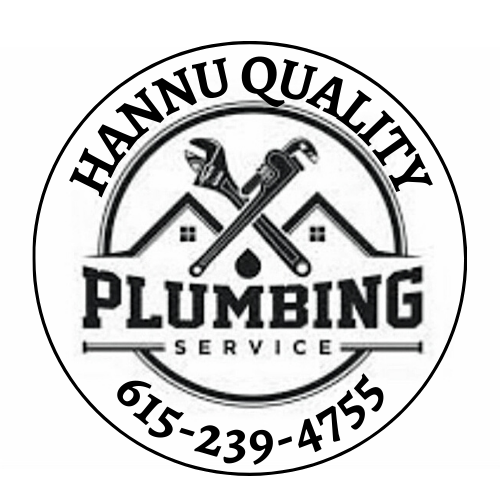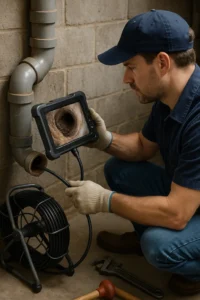Misunderstandings about plumbing are everywhere, but believing in plumbing myths can lead to costly damage and unnecessary repairs. From the idea that hot water clears grease to the misconception that flushable wipes are safe for toilets, these myths often cause more harm than good.
In this expert-backed guide from Hannu Quality Plumbing, we’ll debunk the most common plumbing misconceptions, separate truth from fiction, and give you accurate plumbing facts to help you protect your home.
1. Hot Water Clears Grease from Drains — Myth or Truth?
The Truth About Pouring Grease Down the Sink
One of the most widespread plumbing myths is that running hot water while pouring grease down the drain prevents clogs. While it may seem like a quick solution, the reality is far more damaging.
Plumbing facts: Hot water may melt grease temporarily, but once it cools in the pipes, it solidifies and clings to the interior walls, causing buildup and eventually serious blockages. Over time, this buildup narrows your pipes and leads to expensive drain cleaning or even pipe replacement.
Better solution: Always pour used grease into a container, let it solidify, and dispose of it in the trash. Use paper towels to wipe greasy pans before rinsing.
Believing this myth is one of the most common plumbing misconceptions and often leads to unnecessary plumber visits.
2. Flushable Wipes Are Safe for Toilets — Think Again
The Myth Behind “Flushable” Products
Another common plumbing myth is that products labeled “flushable” are safe to dispose of in your toilet. Unfortunately, most wipes don’t break down like toilet paper and are a major cause of sewer blockages.
Plumbing facts: Unlike toilet paper, flushable wipes stay intact long after flushing. They clump together with other waste, forming large masses (known as fatbergs) that can block pipes and damage septic systems.
What to do instead: Throw wipes and other hygiene products in the trash, even if the packaging says they’re flushable. Your toilet is designed for human waste and toilet paper only.
For a list of other common errors to avoid, check out this helpful article on DIY plumbing mistakes.
3. All Plumbers Are the Same — Debunking the Service Myth
Why Professionalism and Experience Matter
It’s a myth to think all plumbers offer the same quality of service. Just like any profession, experience, licensing, and specialization matter—especially when it comes to complex issues.
Plumbing facts: Choosing a reputable service like general plumbing from Hannu Quality Plumbing ensures you’re working with licensed professionals who understand how to prevent and fix issues according to building codes.
Common plumbing misconceptions often downplay the risks of hiring unqualified individuals, which can lead to shoddy work and safety hazards.
When it comes to plumbing, expertise matters. Whether you’re dealing with a leaking faucet or a broken water heater, trust certified professionals to handle it the right way.
4. Lemons Clean Your Garbage Disposal — Not Really
What Really Happens When You Use Citrus in Your Disposal
You may have heard the claim that tossing lemon peels into your garbage disposal is a great way to clean and freshen it. While lemons do offer a pleasant scent, they don’t do much for cleaning—and can even cause damage.
Plumbing myths: Lemons don’t clean blades or eliminate bacteria. In fact, the acidity can corrode metal parts over time, and peels can jam the system if not shredded properly.
Plumbing facts: Clean your garbage disposal with ice cubes and a little dish soap. For deodorizing, use baking soda and vinegar, which break down residue more effectively without harming the unit.
This is one of those common plumbing misconceptions that seems harmless but can shorten the lifespan of your appliances.
5. Low Water Pressure Means You Need a New Showerhead
Don’t Jump to Conclusions Too Quickly
Many homeowners think poor water pressure is always due to the showerhead itself. While that’s sometimes true, other hidden factors are usually to blame.
Plumbing facts: Low pressure may result from clogged pipes, sediment buildup in your water heater, or hidden leaks. Simply replacing your showerhead won’t solve these underlying issues.
Before replacing any fixtures, consult a professional plumber to inspect the system. Plumbing myths like this can lead to wasteful spending and unresolved issues.
At Hannu Quality Plumbing, we offer accurate diagnostics and long-term solutions tailored to your home’s needs.
6. Final Thoughts: Trust the Facts, Not the Myths
Relying on plumbing myths can do more than waste time—it can damage your system and lead to high repair bills. By understanding the difference between common plumbing misconceptions and verified plumbing facts, you can make smarter decisions that protect your home and save money.
If you’re ever in doubt, trust the experts at Hannu Quality Plumbing. With decades of experience, our licensed professionals are here to help you avoid costly mistakes and keep your plumbing system in top condition.
Break free from plumbing myths and keep your home running smoothly with facts you can rely on.
FAQs: Debunking Plumbing Myths and Staying Informed
1. Are all “flushable” wipes bad for plumbing systems?
Yes. Despite marketing claims, most flushable wipes do not break down like toilet paper and can cause major clogs. This is one of the top common plumbing misconceptions.
2. Can hot water really dissolve grease in the sink?
No. While it temporarily melts grease, it solidifies later in the pipes and leads to blockages. This is a widely believed but harmful plumbing myth.
3. What are the actual signs I need to replace my showerhead?
Low water pressure may not be caused by the showerhead. Plumbing facts suggest looking at your pipes, water heater, or valves before replacing it.
4. Do lemons really clean the garbage disposal?
Not effectively. Lemons provide a fresh scent but don’t clean the blades or internal parts. Use baking soda and vinegar instead.
5. How do I know if my plumber is qualified?
Always check for licensing, reviews, and services offered. For quality assurance, visit our general plumbing services or avoid issues by learning from DIY plumbing mistakes.



